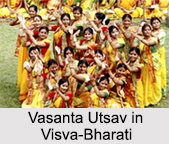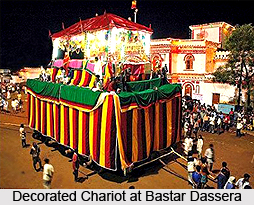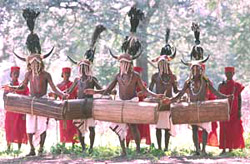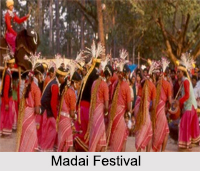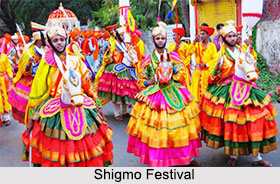 Shigmo is the festival celebrated in the Indian state of Goa. Shigmo is a Konkani word. This word has been derived from the Sanksrit word, Sugrishmak. The Shigmo festival was earlier known as Suggimaho in Shourseni. Following the Hindu calendar, this festival is celebrated in the month of March, also known as Phalguna. But the dates vary according to the Hindu calendar that is based on lunar cycles. It is celebrated just before the Catholic time period of lent during which fasting and abstinence from alcohol and other vices is observed. This festival is also known as spring"s biggest festival. It bids good bye to the winter season and invites spring season.
Shigmo is the festival celebrated in the Indian state of Goa. Shigmo is a Konkani word. This word has been derived from the Sanksrit word, Sugrishmak. The Shigmo festival was earlier known as Suggimaho in Shourseni. Following the Hindu calendar, this festival is celebrated in the month of March, also known as Phalguna. But the dates vary according to the Hindu calendar that is based on lunar cycles. It is celebrated just before the Catholic time period of lent during which fasting and abstinence from alcohol and other vices is observed. This festival is also known as spring"s biggest festival. It bids good bye to the winter season and invites spring season.
Historyof Celebrating Shigmo Festival
Shigmo Festival commenced with the aim to celebrate the homecoming of the warriors at the end of Dusshera. These were the warriors who had to distance themselves from their family members and homes, to engage themselves in a battle with their enemies.
Types of Shigmo Festival
Shigmo Festival is classified into two types. They are the Dhakto Shigmo and Vhadlo Shigmo. The former is also known as small Shigmo, whereas the latter has the other name of big Shigmo. The Vhadlo Shigmo Festival is considered to be of greater importance than the Dhakto Shigmo Festival.
Dhakto Shigmo Festival
Dhakto Shigmo Festival is known to be generally restricted to celebration by the farmers, the labor class and the rural population. Dhakto Shigmo is celebrated in the Old Conquests areas of Goa. Since the advent of sixteenth century, the Portuguese colonial rulers were the masters of these areas for a considerable period of time. The Dhakto Shigmo commences some five days before the full-moon day of the Indian lunar month of Phalguna and ends on the full-moon day. Folk songs and folk dances characterize Dhakto Shigmo.
Vhadlo Shigmo Festival
Vhadlo Shigmo Festival is a counterpart of Dhakto Shigmo Festival. Without any restriction, this festival is celebrated by everyone together. This festival is mostly celebrated in the New Conquests areas of Goa. It commences on the full-moon day of Phalguna and is celebrated for five consecutive days. Vhadlo Shigmo is celebrated in the village temples. It is celebrated in different temples on different dates around the same period. On the first day, the village deity is bathed and dressed in saffron robes. After the offering of food, a feast is held. The temples in Goa and the neighboring states well known for the celebration of Shigmo Festival are the Jambavali, Phatarpya, Kansarpal and Dhargale. A large number of devotees and tourists visit these temples during the celebration of the Vhadlo Shigmo Festival.
Songs and Dances of Shigmo Festival
The Shigmo Festival is characterized by songs sung in chorus by the villagers. These songs are called Naman. These songs are sung when they assemble at a fixed place. Another kind of song sung by the villagers is Jot. Talgadi, Hanpet, Lamp Dance and Gopha are the dances of the Shigmo Festival. Drums like Dhol and Taso are also used to celebrate this festival. People carry these drums, some of which being huge, from door to door, dancing to their sound. These people sing a song called the Tali and in return receive money in a plate carried by the singers. Spirit known as the Gade padap is believed to enter the dancers, on the last day of the festival. When the festival comes to an end a collective bath known as the Mand davarap is taken.
This festival is celebrated with much pomp and gaiety. The festival resembles the colourful event of Holi celebrated in India. The Shigmo festival is also celebrated playing with colored powder and water with friends and relatives.
Present Celebration of Shigmo Festival
Today, Shigmo festival is defined as a street festival. It is celebrated in the form of public parades, which is supported by the state government. These parades are characterized by traditional folk and street dancing and elaborately built floats depicting scenes from regional mythology and religious scenes.
Related Articles:
Indian Regional Festivals
Festivals of Goa
Festivals of Kerala
Festivals of Tamil Nadu
Festivals of Rajasthan
Festivals of Karnataka
Festivals of Chhattisgarh
Festivals of Nagaland
Festivals of Haryana
Festivals of Punjab

